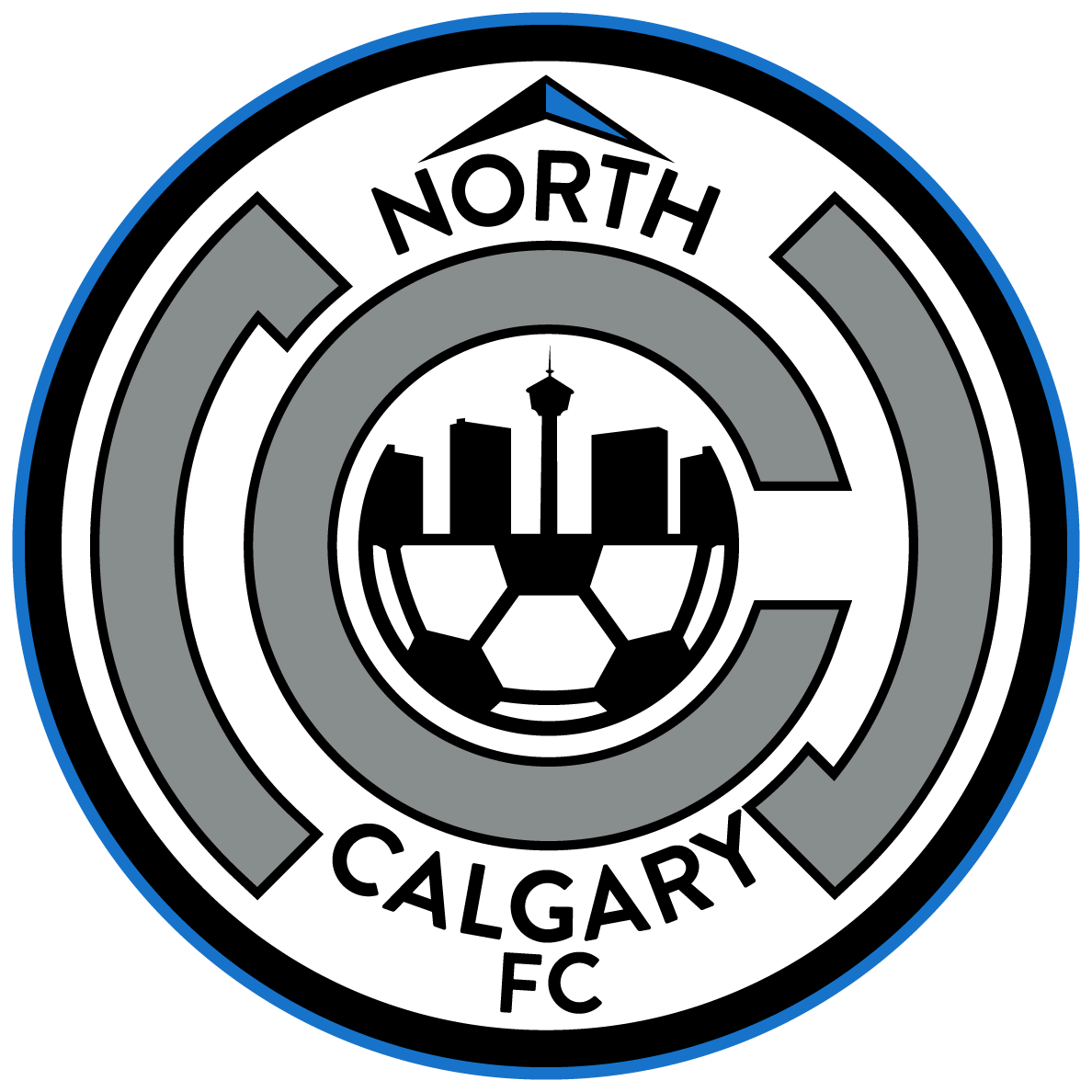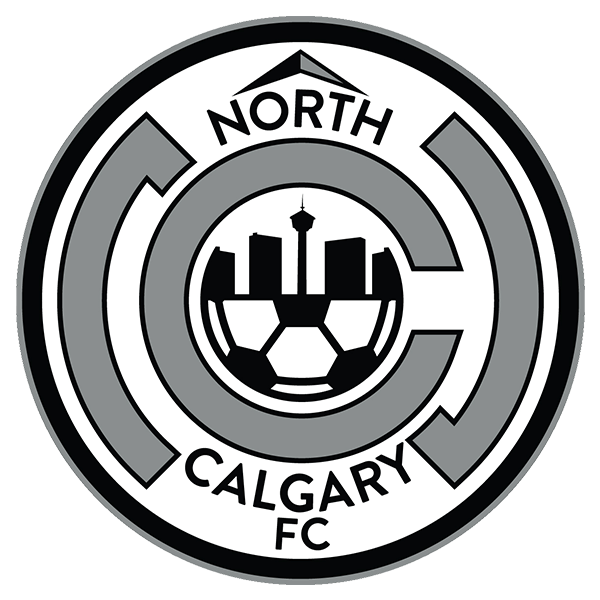Academy Program
The NCFC Academy Program will focus on exposing players to game-based situations where they can further refine their ability to perform soccer specific actions (e.g. passing, creating space, shooting, etc.).
We believe that 1v1 situations are at the core of youth player development, but it is vital that players are also able to recognize space, teammates, and opposition around them, thus the importance of the games-based approach in the Academy Program.
Research into coaching practice within soccer commonly reports that coaches employ a “traditional” approach to skill acquisition. Traditional coaching approaches assume that technique needs to be mastered prior to game play, but these approaches focus on the practice of technical skills often in overly simplistic and unpressurized situations that do not mimic the demands of real game play. This direct approach can create a separation between technique and tactical knowledge, leading to a disconnect between practice and game play where players are not able to respond to game situations.
North Calgary FC believes that the game-based approach is the most effective way to improve decision-making, skill execution, and physical fitness in youth soccer.
We believe that 1v1 situations are at the core of youth player development, but it is vital that players are also able to recognize space, teammates, and opposition around them, thus the importance of the games-based approach in the Academy Program.
Research into coaching practice within soccer commonly reports that coaches employ a “traditional” approach to skill acquisition. Traditional coaching approaches assume that technique needs to be mastered prior to game play, but these approaches focus on the practice of technical skills often in overly simplistic and unpressurized situations that do not mimic the demands of real game play. This direct approach can create a separation between technique and tactical knowledge, leading to a disconnect between practice and game play where players are not able to respond to game situations.
North Calgary FC believes that the game-based approach is the most effective way to improve decision-making, skill execution, and physical fitness in youth soccer.
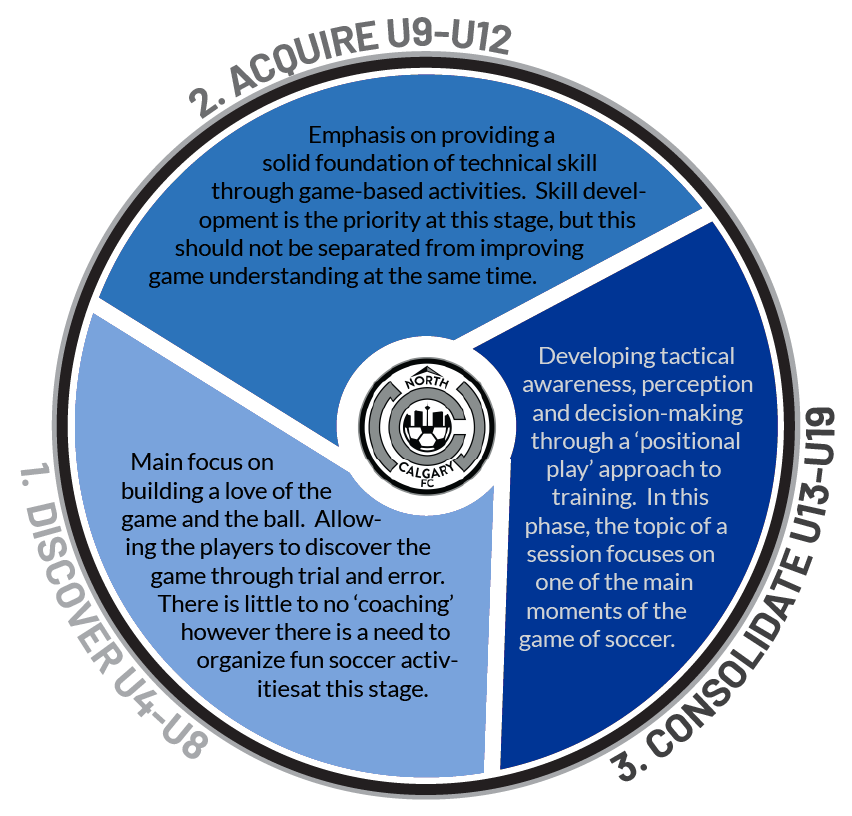
PLAYER DEVELOPMENT PHASES
The PDP provide players with age-specific training, preparing them to be successful in realistic game situations. This lays the foundation for them to progress in their journey towards maximizing their potential as soccer players. Each developmental phase has a set of criteria that our coaches will follow in order to allow players to make appropriate progress while transitioning from one phase to another.
To support our player’s development, the Academy Team has developed a phase-specific curriculum aimed to:
All Academy training sessions will reflect and reinforce the club PDP. Whether the training sessions are delivered by our volunteer coaches when working with their teams, or by our Coaching Team as part of the Academy Program, clear and recognizable learning objectives will be established prior to the sessions in order to offer players the best chance to develop.
To support our player’s development, the Academy Team has developed a phase-specific curriculum aimed to:
- Create an environment where players can experiment, be creative and imaginative without fear of making mistakes
- Develop players that perform quality soccer specific actions on a consistent basis in high-pressure situations
- Promote creative attacking soccer with a focus on creating opportunities and scoring goals
- Instil outstanding social & psychological skills amongst players across the following areas: behaviour , teamwork, accountability, confidence, creativity and concentration
- Support the players in the development of a growth mindset.
All Academy training sessions will reflect and reinforce the club PDP. Whether the training sessions are delivered by our volunteer coaches when working with their teams, or by our Coaching Team as part of the Academy Program, clear and recognizable learning objectives will be established prior to the sessions in order to offer players the best chance to develop.
DISCOVER PHASE
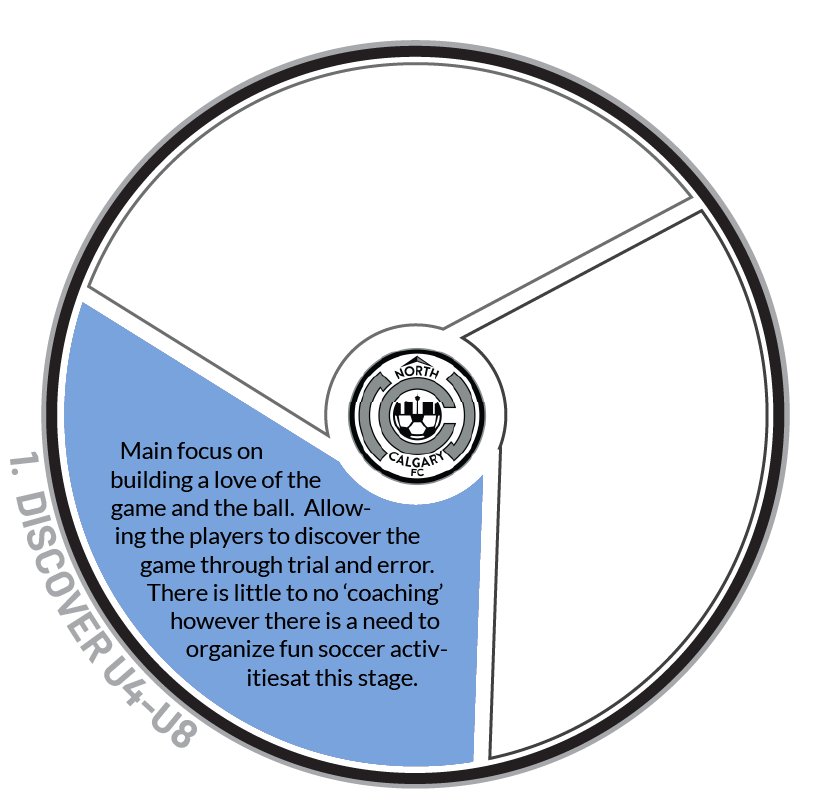
NCFC Juniors is a program for all kids in the Discover Phase, more specifically the U4-U8 age groups. Within the Discover Phase, the kids will be divided into three main training groups as follows: U4-U6, U7, and U8.
There is certainly a progression to it all, but logically, at the U4-U8 age groups players will be encouraged to be on the ball as much as possible. All sessions in the Discover Phase will have a ball per player for at least 75% of the training session so they begin to feel comfortable on the ball. Moreover, only a small percentage of the activities designed by the Academy Team will include isolated, unopposed situations.
The emphasis will be on exposing our youngest players to a high number of game realistic scenarios, mainly 1v1 situations. Within those 1v1 situations, the focus will be on developing dribbling and scoring (shooting) skills. This fits with the psychological and mental capability profile of these young children, who let’s face it, are rather egocentric. They aren’t able to deal with complex decision making required to know when to dribble, and when and whom to pass. The point is, before we start developing the notion of soccer as a passing game, we must focus on the development of skills that suit where they are mentally and cognitively, like keeping the ball, running with the ball and scoring.
The emphasis will be on exposing our youngest players to a high number of game realistic scenarios, mainly 1v1 situations. Within those 1v1 situations, the focus will be on developing dribbling and scoring (shooting) skills. This fits with the psychological and mental capability profile of these young children, who let’s face it, are rather egocentric. They aren’t able to deal with complex decision making required to know when to dribble, and when and whom to pass. The point is, before we start developing the notion of soccer as a passing game, we must focus on the development of skills that suit where they are mentally and cognitively, like keeping the ball, running with the ball and scoring.
"My first question is always: Can this player dribble? I only want players who have that skill so that’s always what I look at. I want full backs and central defenders and midfielders and inside forwards and winger who can dribble. Because you can learn control and good passing…So, yeah, dribbling, that’s the key."
-Pep Guardiola - one of the most successful soccer coaches of all times
-Pep Guardiola - one of the most successful soccer coaches of all times
ACQUIRE PHASE
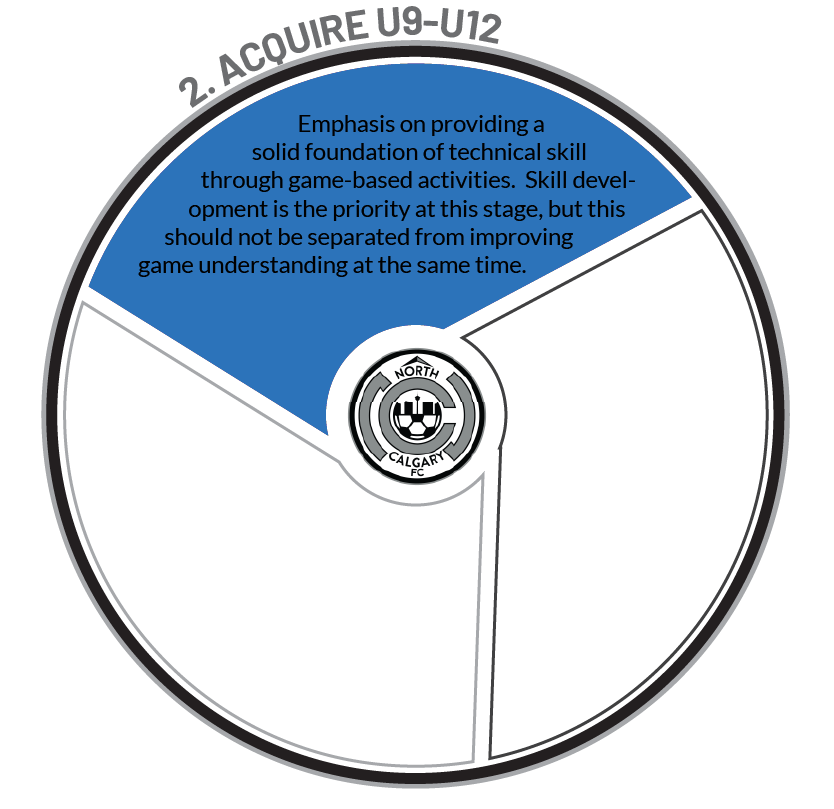
During the Acquire phase of development, players will be encouraged to practice their
technical skills, especially the ability to master the ball with and without pressure (1 vs 1
situations). Players will also be encouraged to express themselves in both training
and games, with little emphasis placed on the outcome (result) of the games. This
learning environment will hopefully lay the foundation for players who are confident,
technically strong and self-motivated to succeed.
Our Academy team will design sessions based on the main moments of the game (attacking, defending & transitions), mainly emphasizing the following four core skills:
Our Academy team will design sessions based on the main moments of the game (attacking, defending & transitions), mainly emphasizing the following four core skills:
- First touch
- Striking the ball
- Running with the ball
- 1v1 attacking and defending situations
All players in the Acquire Phase will take part in our Academy Program.
In addition, volunteer head coaches will
deliver an extra team practice on a weekly-basis for the duration
of the season. Our Academy team will work closely with our volunteer
coaches to ensure they receive all the support in terms of session plans
and areas to focus on in order to maximize player learning.
CONSOLIDATE PHASE
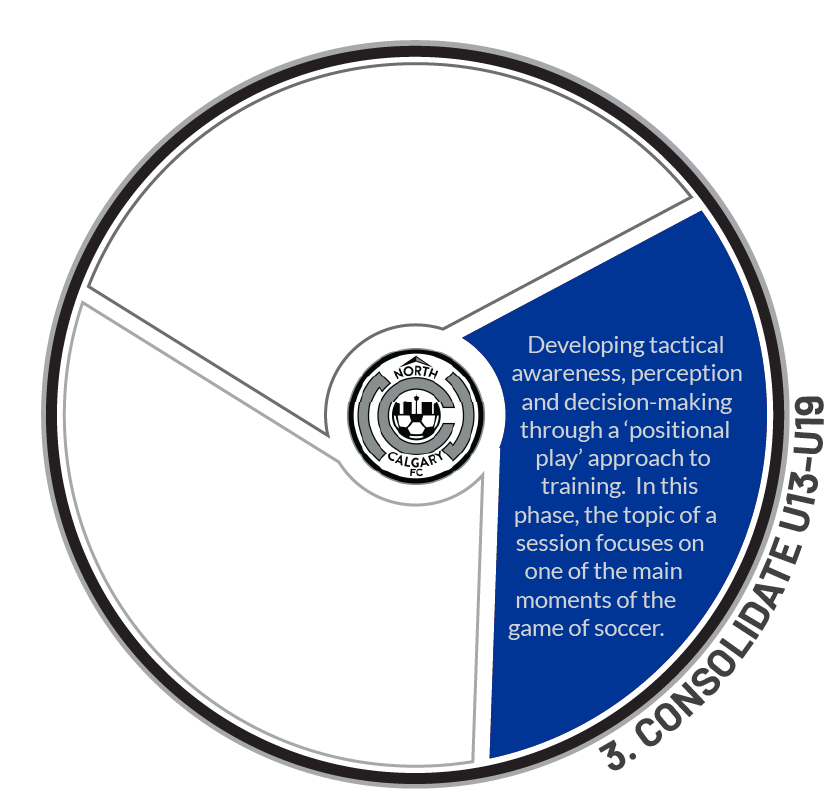
Whereas the purpose of the Acquire Phase (U9-U12) is to develop the core
skills, the Consolidate Phase is about learning how to apply them in a
functional way. In the Consolidate Phase the focus shifts towards learning to
play as a team and developing an understanding of the team tasks during
the main moments (attacking; defending; transitioning), as well as the
specific tasks that go with the individual team positions.
Similar to the sessions of the Acquire Phase (U9-U12), the sessions of the Consolidate Phase are also ‘theme based’. While in the Acquire Phase the ‘theme’ of a session focuses on one of the four core skills (first touch; running with the ball; 1 v 1; striking the ball), in the Consolidate Phase the ‘theme’ of a session focuses on one of the main moments of the game (attacking, defending & transitions), and the team tasks within that main moment. To design the Consolidate Phase sessions more practically, we have subdivided the main moments of the game into the following themes:
Similar to the sessions of the Acquire Phase (U9-U12), the sessions of the Consolidate Phase are also ‘theme based’. While in the Acquire Phase the ‘theme’ of a session focuses on one of the four core skills (first touch; running with the ball; 1 v 1; striking the ball), in the Consolidate Phase the ‘theme’ of a session focuses on one of the main moments of the game (attacking, defending & transitions), and the team tasks within that main moment. To design the Consolidate Phase sessions more practically, we have subdivided the main moments of the game into the following themes:
ATTACKING
Playing out from the back
Midfield Play
Creating Scoring Opportunities
Midfield Play
Creating Scoring Opportunities
DEFENDING
Disturbing / Pressuring
Regaining Possession
Regaining Possession
TRANSITION TO ATTACKING
Team and player actions when we win
the ball
TRANSITION TO DEFENDING
Team and player actions when we lose
the ball
Since Consolidate Phase sessions should strive for game realistic scenarios, the
practices must include game specific resistances such as opponents, team-mates,
direction, rules and appropriate dimensions. As a consequence, in Consolidate
Phase sessions often all three Main Moments take place continuously, but the
coaching focus is on one of them.
Consolidate Phase sessions consist of 4 components:
Consolidate Phase sessions consist of 4 components:
- Warm Up - Typically with the ball (e.g. passing combinations), and ideally including a level of decision making
- Positioning Games - In these activities players learn to create several options for the ball carrier through proper positioning. Additionally, players will improve their decision making by learning to choose the most effective option
- Phase of Play - This is the part of the session where conscious teaching and learning of the designated team task (e.g. playing out from the back) takes place
- Training Game - This is the traditional game at the end of a session. In our approach however this is not just a ‘free’ game. It is a game that contains all the elements of the real game but with rules and constraints that ensure the designated Team Task is emphasized.
All players in the Consolidate Phase will take part in the
Academy Program. In addition,
volunteer head coaches will deliver an extra team practice on a weekly-basis for
the entire duration of the season. Our Academy team will work closely with our
volunteer coaches to ensure they receive all the support in terms of session
plans and areas to focus on in order to maximize player learning.
GAME MODEL
The Game Model is a set of principles that guide the behaviour of
our players and teams.
Our approach is to be proactive in all moments of the game. We compete each week with the goal of being successful by playing positive soccer.
We encourage our players to be brave and creative while performing soccer specific actions (passing, dribbling, creating space, etc.) on/off the ball during the attacking phase. Starting from the back, through the midfield, and in front of the opposition goal. Even the youngest teams in the Acquire Phase (U9-U12) will be encouraged to exploit space and receive the ball in areas of the field that are traditionally considered ‘dangerous’ by many coaches, parents and even team mates. Why? Because players learn by doing and only by allowing them to solve high pressure situations they will become more confident.
When we lose the ball, we ask our players to apply immediate pressure to win it back. We aim to press high in the opponents half to force a mistake to regain the ball. When we win the ball back our first objective is to attempt to play the ball forward to counter attack with numbers to create chances and score goals.
Our approach is to be proactive in all moments of the game. We compete each week with the goal of being successful by playing positive soccer.
We encourage our players to be brave and creative while performing soccer specific actions (passing, dribbling, creating space, etc.) on/off the ball during the attacking phase. Starting from the back, through the midfield, and in front of the opposition goal. Even the youngest teams in the Acquire Phase (U9-U12) will be encouraged to exploit space and receive the ball in areas of the field that are traditionally considered ‘dangerous’ by many coaches, parents and even team mates. Why? Because players learn by doing and only by allowing them to solve high pressure situations they will become more confident.
When we lose the ball, we ask our players to apply immediate pressure to win it back. We aim to press high in the opponents half to force a mistake to regain the ball. When we win the ball back our first objective is to attempt to play the ball forward to counter attack with numbers to create chances and score goals.
